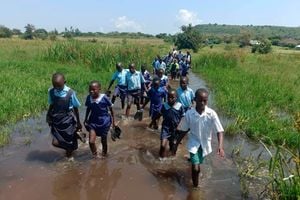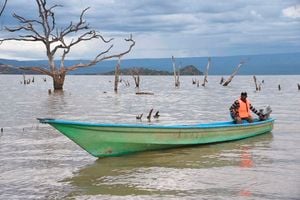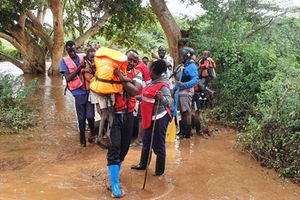
Some of the pupils of Loruk Primary School study under a tree on the shores of Lake Baringo on September 9, 2024. The lake has grown exponentially, swallowing adjacent buildings including the school's playground and forcing hippos and crocodiles to move closer to the school.
On Monday afternoon, learners at Loruk Primary School on the shores of Lake Baringo took their afternoon lunch break. Some revised under trees while shielding themselves from the scorching afternoon sun as they waited for their afternoon lessons to resume.
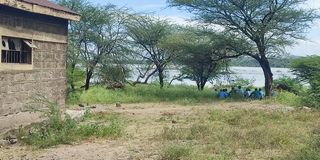
Some of the pupils of Loruk Primary School studied under a tree on the shores of Lake Baringo on September 9, 2024.
Approximately 50 meters from the school compound, a herd of hippopotamuses was swimming in the adjacent lake. After its water levels increased exponentially, the herd moved closer to the institution.
Oblivious to the dangers, the learners also fetch water at the shores of the lake, some washing their utensils and dusty feet as the animals watch from a close distance.
Apart from the hippos, Lake Baringo is also infested with crocodiles and snakes, posing a security risk to the learners at the school in Baringo North.
Water levels have risen to 50 metres, swallowing the school’s playing field and some structures more than 100 meters. Crocodiles and hippos have been seen close to the school compound, posing a security risk to learners.

The rising water level has caused crocodiles and hippos to move closer to the school.
According to school head teacher Isaac Rerimoi, the water levels increased gradually two months ago following the heavy rains that pounded the area and submerged adjacent structures, including the boys’ pit latrines.
“The school is adjacent to the lake, whose water levels have increased tremendously for the past two months,” said Mr Rerimoi.
The school has 60 students in the boarding section, and with the lurking animals in the compound overgrown with vegetation owing to the rains, the learners are at risk, especially at night.
Nation.Africa team toured the school on Monday and counted more than 15 hippos roaming just a few meters from the school as the learners continued their activities.
Nation.Africa confirmed that the situation has been worsened by the lack of a fence or a perimeter wall to keep out intruding wildlife.
“The wildlife moves out of the water into the school compound and villages, especially at night, in search of pasture, posing a threat to our boarders, who must go out to relieve themselves at the pit latrines. We also have venomous snakes coming out due to the flooding,” said the school head.
The flooding has cut off the school from the main road, and teachers and their learners are forced to use an alternative long route.
This is the same school that flooded four years ago, submerging the boys’ dormitory, which had a capacity of 80 pupils, pit latrines, and a playing field. Learners were forced to use canoes to access the institution after the lake waters swallowed the main roads.
To remedy the situation, the government intervened and moved the institution to a safer area five kilometres away. This saw the commencement of the construction of a boys’ dormitory.
However, this turned into a white elephant, as the proposed site was far from villages where locals lived and were also on a border area faced with frequent bandit attacks, hence a security threat, the head teacher told Nation.Africa.
“The project ended up being a white elephant, and we relocated to our school after the flood waters receded. The boys are now sleeping in one of the classrooms, but we fear the school will be swallowed again as the water levels keep rising daily,” said Mr Rerimoi.

The lake has grown exponentially, swallowing adjacent buildings including the school's playground and forcing hippos and crocodiles to move closer to the school.
This is the situation at Noosukro Primary School in Baringo South, where some structures have been swallowed by rising waters in the bordering lake.
School head teacher Jeremiah Nakure told Nation.Africa learning is yet to resume for the third term after some structures, including the playing field, were swallowed by the flooding.
The management is concerned about attacks by hippos and crocodiles as the lake has moved closer to people’s homesteads and the school, presenting a human-wildlife conflict situation.
The school management met parents last Wednesday to discuss the fate of the learners amid the evident threats.
“Our institution is adjacent to Lake Baringo and we are yet to resume learning this term owing to the flooding that has swallowed our playing field, three pit latrines, and the teachers’ quarters built by the community. The classrooms are on the verge of being swallowed as well should the heavy rainfall persist,” said Mr Nakure.
He revealed that talks with parents centred on the possible relocation of the learners to an island should the situation worsen.
“We will be forced to teach the learners under trees as we look for temporary tents because the school can only be accessed by boats, while some learners will be forced to wade through the crocodile-infested lake to reach it,” he said.
In 2020, high water levels in Lake Baringo also swallowed the school completely, forcing pupils out of class.
Transport on the adjacent Marigat-Chemolingot road had also been hampered after it was swallowed by the lake, forcing motorists to use an alternative route. The road is also on the verge of being swallowed again.
The tourism sector has also suffered a big blow, as some hotels bordering the lakes have been swallowed by the lake waters.
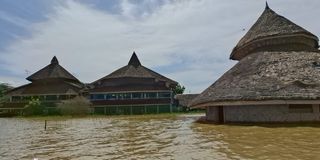
Some of the structures at Soi Safari Lodge on the shores of Lake Baringo have been submerged by the rising waters of the lake, which has risen more than ten metres in three months.
Among those affected is Soi Safari Lodge on the shores of Lake Baringo, where more than 56 rooms, a conference hall, and part of the restaurant have been swallowed by high water levels.
Lake Baringo senior warden Jackson Komen acknowledged that the water levels at the Lake had risen tremendously, swallowing some adjacent structures bordering it.
According to the warden, the water has increased by an average of 15 meters around the lake in three months, and there are fears that it would still rise should the rains persist.
He attributed the rise to the long rise and siltation caused by human activities upstream. Owing to the hippo and crocodile-infested lake, this raised fears of human-wildlife conflicts and snake bites in neighbouring villages.

